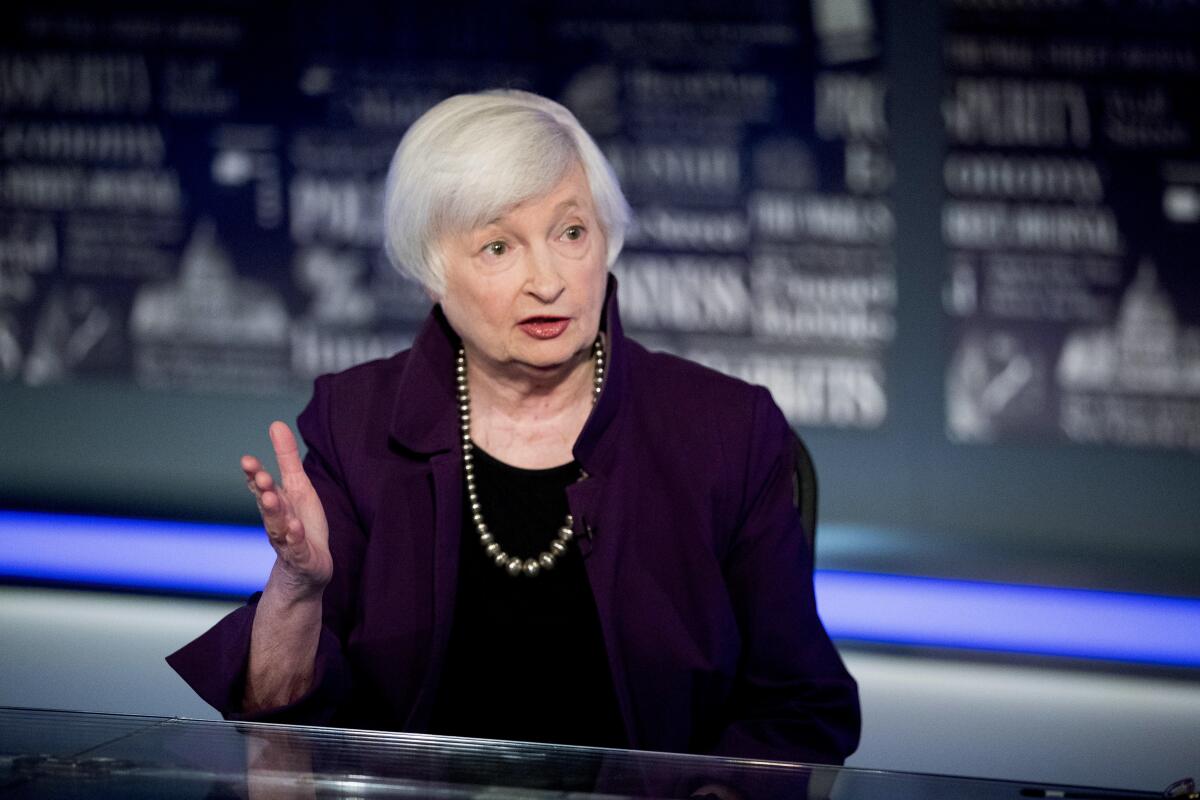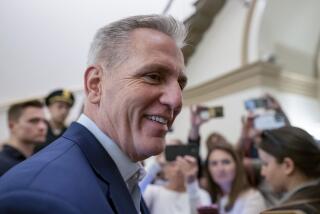Janet Yellen pushes GOP senators on $1.9-trillion COVID-19 relief package

- Share via
Janet Yellen, President-elect Joe Biden’s choice as Treasury secretary, said Tuesday that the incoming administration would focus on winning quick passage of its $1.9-trillion pandemic relief plan, rejecting Republican arguments that the measure is too big given the size of U.S. budget deficits.
“More must be done,” Yellen told the Senate Finance Committee during her confirmation hearing. “Without further action, we risk a longer, more painful recession now — and long-term scarring of the economy later.”
Democrats voiced support for the Biden proposal while Republicans questioned spending nearly $2 trillion on top of the nearly $3 trillion in various packages that Congress passed last year.
Republicans questioned elements of the Biden proposal such as providing an additional $1,400 stimulus check to individuals earning less than $75,000 per year. They also objected to the inclusion of such long-term Democratic goals as boosting the minimum wage to $15 an hour.
Sen. Tim Scott (R-S.C.) said that the push for a higher minimum wage comes at a time when thousands of small businesses such as restaurants have gone under, and that it would lead to more job losses.
Yellen said, however, that the increase in the minimum wage would help millions of front-line American workers who are risking their lives to keep their communities functioning and often working two jobs to put food on the table. “They are struggling to get by,” she said.
Despite policy differences, Yellen, who would be the first woman to be Treasury secretary after being the first woman to be chair of the Federal Reserve, is expected to win quick Senate confirmation.
Sen. Ron Wyden (D-Ore.), who will become Finance Committee chairman when Democrats take over the Senate, said it was his hope that Yellen could be confirmed by the full Senate as soon as Thursday.
Biden last week unveiled a $1.9-trillion relief plan that would provide more aid to American families and businesses and more support for vaccine production and distribution as well as providing support for states and localities to avoid layoffs of teachers and first responders.
Many Republicans raised the soaring budget deficits as a reason to be cautious in passing further relief. Last year, the budget deficit climbed to a record $3.1 trillion.
Yellen said that she and Biden were aware of the country’s rising debt burden but felt that fighting the pandemic recession was currently more important.
“Right now, with interest rates at historic lows, the smartest thing we can do is act big,” she said. “In the long run, I believe the benefits will far outweigh the costs, especially if we care about helping people who have been struggling for a very long time.”
Also during Tuesday’s hearing, Yellen said that the U.S. won’t seek a weaker exchange rate to gain advantage over other nations, and that if she’s confirmed as Treasury secretary, she will work against any moves by other countries to pursue such a strategy.
Yellen said she would work “to oppose any and all attempts by foreign countries to artificially manipulate currency values to gain advantage in trade.”
Mark Sobel, a former U.S. Treasury official, said her stance felt like “a reiteration of the traditional policy.”
“I think there was excessive market/media focus on the ‘strong dollar’ language” touted by the Trump administration, said Sobel, who is now at the Official Monetary and Financial Institutions Forum. “The dollar policy was traditionally always about letting the markets decide and keeping official views out of it, except in rare circumstances.”
Yellen also said that the Biden administration will be prepared to take on China over what she said was its theft of intellectual property, dumping of products on global markets and adoption of subsidies for its businesses.
Additionally, a noncommittal comment by Yellen convinced Treasury traders there’s a chance the U.S. will expand maturities in the world’s biggest bond market beyond 30 years.
The Treasury Department has pondered ultralong bonds for years, but they’ve never been introduced, in part because of resistance from Wall Street. But Yellen touched on the topic Tuesday: “There is an advantage to funding the debt, especially when interest rates are very low, by issuing long-term debt, and I would be very pleased to look at this issue and examine what the market would be like for bonds of this maturity,” Yellen said when asked about longer-term debt, including 50-year Treasuries.
Markets responded, with traders selling 30-year bonds. But that doesn’t mean a change is necessarily coming. “I think a 50-year bond is still a long shot,” said Subadra Rajappa, head of U.S. rates strategy at Societe Generale.
Yellen was nominated to be chairwoman of the Fed by then-President Obama, and she stepped down in early 2018 after Trump decided not to nominate her for a second four-year term. Since leaving the Fed, Yellen has been a distinguished researcher at the Brookings Institution, a Washington think tank.
In the financial disclosure forms filed with the committee, Yellen listed more than $7 million in speaking fees she has received from a number of top Wall Street firms such as Goldman Sachs and Citigroup since leaving the Fed. Yellen has agreed to recuse herself from Treasury matters involving certain firms that have compensated her for her talks.
Yellen’s Treasury nomination was supported in a letter from eight previous Treasury secretaries serving both Republican and Democratic administrations.
Bloomberg was used in compiling this report.
More to Read
Inside the business of entertainment
The Wide Shot brings you news, analysis and insights on everything from streaming wars to production — and what it all means for the future.
You may occasionally receive promotional content from the Los Angeles Times.










